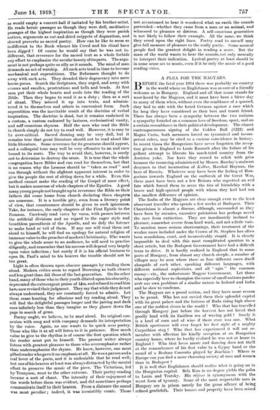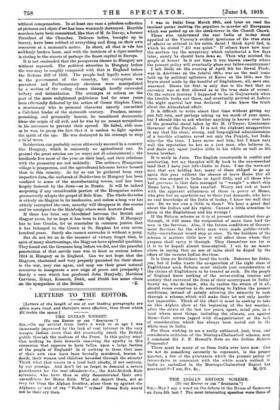A PLEA FOR THE MAGYARS.
BEFORE the fatal year 1914 there was probably no country 1.1 in the world where an Englishman was so sure of a friendly welcome as in Hungary. England and all that name stands for were loved by the Magyars, and it must have been a bitter day to many of them when, without even the semblance of a quarrel, they had to side with the hated German against a race which for long they have considered as their best and truest friend. There has always been a sympathy between the two nations. a sympathy founded on a common love of freedom, sport, and on a certain resemblance in their political development. The almost contemporaneous signing of the Golden Bull (1222) and Magna Carta, both measures forced on tyrannical and incom- petent rulers, may be cited as a curious coincidence in history. In recent times the Hungarians have never forgotten the recep- tion given in England to Louis Kossuth after the failure of his gallant attempt to liberate his much-tried country from the Austrian yoke. Nor have they ceased to relish with grim humour the trouncing administered by Messrs. Barelay's stalwart draymen to that incarnation of Kultur, Marshal Haynau, the hero of Brescia. Whatever may have been the feeling of Hun- garians towards England on the outbreak of the Great War, there must have been not a few Britons who regretted an evil fate which forced them to sever the ties of friendship with a brave and high-spirited people with whom they had had not the smallest difference of opinion.
The faults of the Magyars are clear enough even to the least observant traveller who spends a few weeks at Budapest. Their Chauvinism is almost a disease, although, surrounded as they have been by enemies, excessive patriotism has perhaps saved the race from extinction. They are inordinately inclined to pleasure, somewhat averse f torn hard work, and not a little vain. To mention more serious shortcoiuings, their treatment of the weaker races included under the Crown of St. Stephen has often been scandalous, cruel, and inconceivably stupid. It is clearly impossible to deal with this most complicated question in a short article, but the Budapest Government have had a difficult team to drive. It is hardly realized in England that in some parts of Hungary, from almost any church steeple, a number of villages may be seen where three or four different races dwell alongside of each other, speaking different languages, with different national aspirations, and all " agin " the common enemy—viz., the unfortunate Mauer Government. Let those who especially love to champion the cause of small nations ponder over our own problems of a similar nature in Ireland and India and be slow to condemn. •
The Magyars are a proud nation, and they have sonic reason to be proud. Who has not envied them their splendid capital with its great palace and the fortresa of Buda rising high above one of the noblest rivers in the world ? Who that has travelled through Hungary just before the harvest has not loved that goodly land with its limitless sea of waving gold ? Surely it is a land of corn and of wine if there over was one. What British sportsman will ever forget his first sight of a mighty Carpathian stag ? Who that has experienced it will not re- member with affection his kindly reception at an Hungarian country house, where he hardly realized he was not at home in England ? Who that loves music and dancing does not thrill at the remembrance of his first valse to a Gypsy band or the sound of a Brahms Concerto played by Joachim ? Where hi Europe can you find a more charming society of men and women than in Budapest ?
It is well that Englishmen should realize what is going on in the Hungarian capital. Bela Kun in no degree yields the palm to Lenin and Trotsky. His regime is synonymous with the worst form of tyranny. Some of the most respectable men in Hungary are in prison merely for the gross offence of being refined gentlefolk. Their houses and property have been seized
without compensation. In at least one ease a priceless collection of pictures and objete d'art has been wantonly destroyed. Horrible murders have been committed, like that of M. de Navay, a former President of the Chamber. Delicate ladies, brought up in luxury, have been robbed of everything and flung on their own resources at a moment's notice. In short, all that is vile has suddenly broken loose, and with the instincts; of a tiger-monkey is rioting in the streets of perhaps the finest capital in Europe. It is not contended that the prosperous classes in Hungary are - without reproach. The political situation in HE= before the war may be roughly compared with that in d before the Reform Bill of 1832. The people had legally some share in the government of the country, but corruption was prevalent and Parliamentary elections were manipulated by a section of the ruling classes through hardly concealed bribery and intimidation. The attempts at reform on the part of the more enlightened politicians had for some years been effectually defeated by the action of Count Stephen Tisza, a reactionary who in personal character exactly resembled a Calvinist leader of the sixteenth century. Fearless, uncom- promising, and personally honest, he considered democratic ideas the origin of all evil, and he was by no means scrupulous in his measures to prevent their ;Tread. He failed, able man as he was, to grasp the fact that it is useless to fight against the spirit of the age. He was destroyed in his attempt to stop a tidal wave.
Bolshevism can probably never ultimately succeed in a country like Hungary, which is eminently an agricultural one. In general the great estates are (or were) not ill-administered ; the landlords live most of the year on their land, and their relations with the peasantry are not unkindly. The ordinary Hungarian village is prosperous, and the agricultural labourer better housed than in this country. As far as can be gathered from very imperfect data, the outbreak of Bolshevism in Hungary has been confined to some of the manufacturing towns, and has been largely fostered by the Jews—se in Russia. It will be indeed surprising if any considerable portion of the Hungarian nation permanently adopts the gospel of Bela Hun. The whole doctrine is utterly un-Magyar in its tendencies, and unless along war has utterly corrupted the race, anarchy will disappear in due course and be consigned to the Malebolge where such horrors dwell.
If there has been any bloodshed between the British and Magyar races, let us hope it has been in fair fight If Hungary ham to lose Croatia, let us remember in common justice that it has belonged to the Crown of St. Stephen for over seven hundred years. Surely she cannot surrender it without a pang.
But do not let us in the moment of victory forget that, in spite of many shortcomings, the Magyars have splendid qualities. They found out the Germans long before we did, and the peaceful penetration of that servile race was at least as serious before 1914 in Hungary as in England. Can we not hope that the Magyars, chastened and very properly punished for their share in the war, may rise again, and may use their great natural resources to inaugurate a new reign of peace and prosperity Surely a race which has produced John Hunyady, Matthias Corvinus, Zrinyi, Kossuth, Hair., and Petifi has some claim
on the sympathies of the British. • Z.



































 Previous page
Previous page